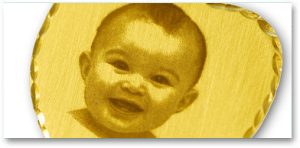YVO4 Compatible Materials
Metals – Direct Metal Marking
Virtually every common metal (and a number of uncommon ones) can be marked with a YVO4 Laser and our model, the RMI 1064nm laser marking system. Precious metals, stainless and hardened steel, copper and anodized aluminum all mark extremely well. Some metals are more difficult to mark.
Highly polished and reflective metals, although they can be marked, sometimes present difficulties to barcode scanners. The best way to tell how well our equipment will perform on your materials is to send some samples to our applications lab. We will mark them and return them with a detailed report, including settings used and marking times for future reference. CO2 lasers do not mark well on metals, although results may be acceptable if an additional series of steps are taken. However, the resolution and clarity of a CO2 laser mark will never approach that of a mark made by an Nd: YVO4 laser.
Plastics
Almost all plastics mark extremely well, however, additives and pigments can affect the material’s ability to mark. In certain cases, the mark can be greatly improved by changing the formulation. But if the formulation is changed by a vendor, the resulting mark may no longer be acceptable. Sending samples is always the best way to find out. Most plastics mark well with a 1064nm marker; others may work better with the 532nm wavelength.
Silicon Wafers
Silicon wafers are often marked with data matrices and serial numbers. The wavelength of choice is usually 532nm, but in some applications, 1064nm may work better. Experimentation works best, and we would be glad to help with a particular project. For a research laboratory or small-volume manufacturing the U-5G laser marking system is an excellent choice for reliable, affordable scribing.
Ceramics
Acceptable marks can be obtained with ceramics, depending on their composition. Black alumina marks well, as does TTZ. 1064nm and 532nm seem to yield the same result.
Gemstones
Some Gemstones can be marked, depending on their color and clarity.
Silicone Rubber
Silicone rubber, such as is used in breast implants or in baby bottles marks very well with a 532nm marker.
An Nd: YVO4 marker may not be the best choice for:
- Clear, colorless glass and other clear, colorless materials with no additives.
- Organic materials such as wood, stone, bone and paper.
- Most polyethylenes, polypropylenes, polyurethanes and Teflon.
- Finely textured surfaces


